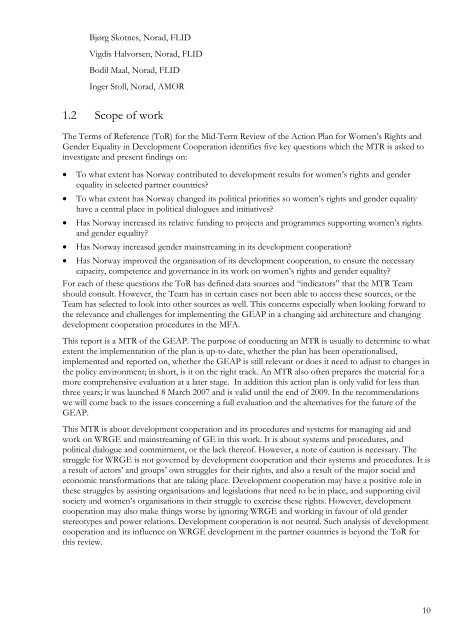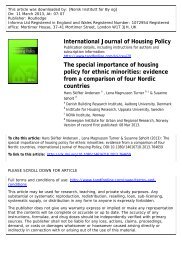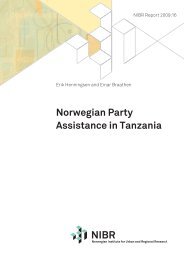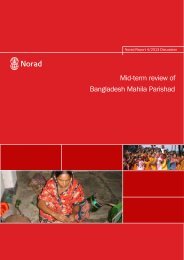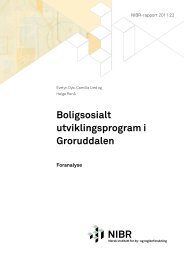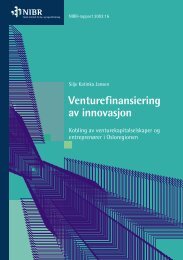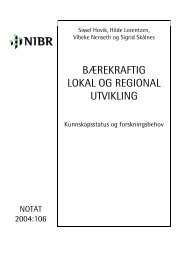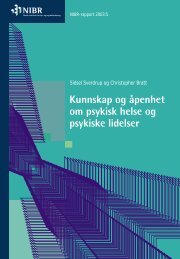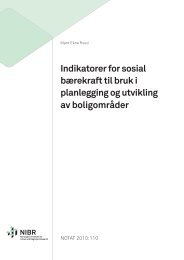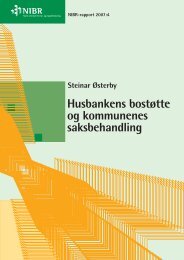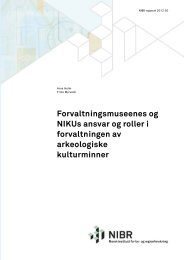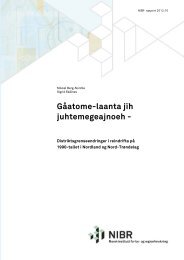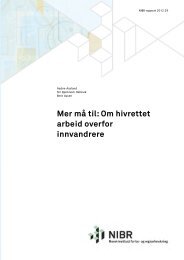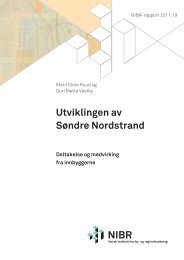Mid-Term Review of the Norwegian Action Plan for Women's ... - Norad
Mid-Term Review of the Norwegian Action Plan for Women's ... - Norad
Mid-Term Review of the Norwegian Action Plan for Women's ... - Norad
Create successful ePaper yourself
Turn your PDF publications into a flip-book with our unique Google optimized e-Paper software.
Bjørg Skotnes, <strong>Norad</strong>, FLIDVigdis Halvorsen, <strong>Norad</strong>, FLIDBodil Maal, <strong>Norad</strong>, FLIDInger Stoll, <strong>Norad</strong>, AMOR1.2 Scope <strong>of</strong> workThe <strong>Term</strong>s <strong>of</strong> Reference (ToR) <strong>for</strong> <strong>the</strong> <strong>Mid</strong>-<strong>Term</strong> <strong>Review</strong> <strong>of</strong> <strong>the</strong> <strong>Action</strong> <strong>Plan</strong> <strong>for</strong> Women’s Rights andGender Equality in Development Cooperation identifies five key questions which <strong>the</strong> MTR is asked toinvestigate and present findings on:To what extent has Norway contributed to development results <strong>for</strong> women’s rights and genderequality in selected partner countries?To what extent has Norway changed its political priorities so women’s rights and gender equalityhave a central place in political dialogues and initiatives?Has Norway increased its relative funding to projects and programmes supporting women’s rightsand gender equality?Has Norway increased gender mainstreaming in its development cooperation?Has Norway improved <strong>the</strong> organisation <strong>of</strong> its development cooperation, to ensure <strong>the</strong> necessarycapacity, competence and governance in its work on women’s rights and gender equality?For each <strong>of</strong> <strong>the</strong>se questions <strong>the</strong> ToR has defined data sources and “indicators” that <strong>the</strong> MTR Teamshould consult. However, <strong>the</strong> Team has in certain cases not been able to access <strong>the</strong>se sources, or <strong>the</strong>Team has selected to look into o<strong>the</strong>r sources as well. This concerns especially when looking <strong>for</strong>ward to<strong>the</strong> relevance and challenges <strong>for</strong> implementing <strong>the</strong> GEAP in a changing aid architecture and changingdevelopment cooperation procedures in <strong>the</strong> MFA.This report is a MTR <strong>of</strong> <strong>the</strong> GEAP. The purpose <strong>of</strong> conducting an MTR is usually to determine to whatextent <strong>the</strong> implementation <strong>of</strong> <strong>the</strong> plan is up-to-date, whe<strong>the</strong>r <strong>the</strong> plan has been operationalised,implemented and reported on, whe<strong>the</strong>r <strong>the</strong> GEAP is still relevant or does it need to adjust to changes in<strong>the</strong> policy environment; in short, is it on <strong>the</strong> right track. An MTR also <strong>of</strong>ten prepares <strong>the</strong> material <strong>for</strong> amore comprehensive evaluation at a later stage. In addition this action plan is only valid <strong>for</strong> less thanthree years; it was launched 8 March 2007 and is valid until <strong>the</strong> end <strong>of</strong> 2009. In <strong>the</strong> recommendationswe will come back to <strong>the</strong> issues concerning a full evaluation and <strong>the</strong> alternatives <strong>for</strong> <strong>the</strong> future <strong>of</strong> <strong>the</strong>GEAP.This MTR is about development cooperation and its procedures and systems <strong>for</strong> managing aid andwork on WRGE and mainstreaming <strong>of</strong> GE in this work. It is about systems and procedures, andpolitical dialogue and commitment, or <strong>the</strong> lack <strong>the</strong>re<strong>of</strong>. However, a note <strong>of</strong> caution is necessary. Thestruggle <strong>for</strong> WRGE is not governed by development cooperation and <strong>the</strong>ir systems and procedures. It isa result <strong>of</strong> actors’ and groups’ own struggles <strong>for</strong> <strong>the</strong>ir rights, and also a result <strong>of</strong> <strong>the</strong> major social andeconomic trans<strong>for</strong>mations that are taking place. Development cooperation may have a positive role in<strong>the</strong>se struggles by assisting organisations and legislations that need to be in place, and supporting civilsociety and women’s organisations in <strong>the</strong>ir struggle to exercise <strong>the</strong>se rights. However, developmentcooperation may also make things worse by ignoring WRGE and working in favour <strong>of</strong> old genderstereotypes and power relations. Development cooperation is not neutral. Such analysis <strong>of</strong> developmentcooperation and its influence on WRGE development in <strong>the</strong> partner countries is beyond <strong>the</strong> ToR <strong>for</strong>this review.10


